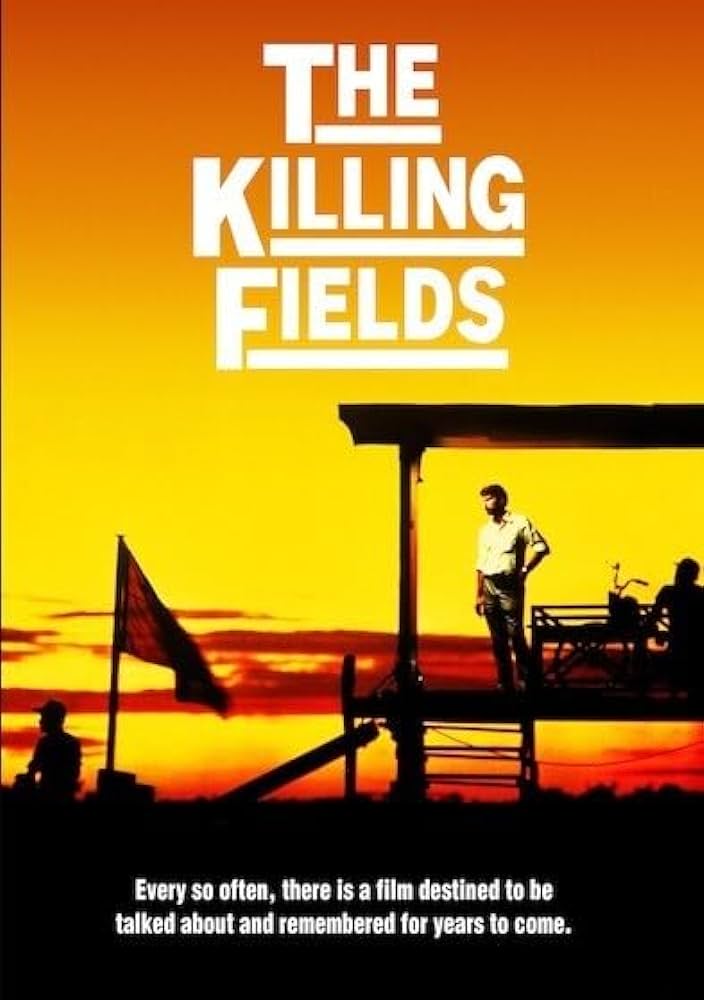Over at Law and Liberty, I had the great privilege of offering a 40th anniversary retrospective of the 1984 movie, The Killing Fields: https://lawliberty.org/the-tragedy-and-triumph-of-the-killing-fields/
A reader responded to me over at my other website, Stormfields. Here’s the note he left–
Dear Dr. Birzer,
Your piece on “The Killing Fields” was timely in an Internet sense, in that the film has been prominently on Netflix of late and a lot of folks may be rewatching or encountering it for the first time (me). Your essay made me want to contact you directly. I’m fine with doing so here. I completely agree with perhaps 90% of your take on the film; the other 10% I vehemently disagree with, because it is Reaganite revisionism.
The issue you DO touch on– the culpability of the U.S. in regimes like KR coming to power– is where we disagree. The Cambodian genocide never happens if the U.S. doesn’t decide to fight (and lose) a catastrophic proxy war in Vietnam. Wars destabilize nearby countries. This was OUR fault. The movie, in fact, makes this very clear, putting it in lines spoken by Sam Waterston’s Sydney Schanberg. The intensification of conflicts and wars makes groups like KR MORE paranoid and ruthless in their aims.
You also have quite a lot of nerve to call the KR “racist” because they were slaughtering ethnic minorities (although, curiously, they idolized the Chinese Mao). What was the U.S., then, who are estimated to have killed some 3 million people in Vietnam? I always return to the General Westmoreland’s response in “Hearts and Minds”: “Life is cheap in the Orient.” What could be a more racist justification for wanton slaughter of soldiers and civilians alike?
I have to admit my disbelief that you are trying to use this film as a rationale for your larger project of Christian nationalism. At the same time, it intrigues me that you would do so, and that you are actually interested in memory– unlike most of the Right in the U.S. right now. So I hope you’ll engage me in a dialogue.

My response.
Dear Roberto, thanks so much for your note. I appreciate your taking me and my arguments seriously.
Honestly, I don’t think we disagree on much. Maybe my wording was a little off. Here’s what I wrote in the unedited version of the piece regarding U.S. involvement:
The U.S. Role
In 1970, a military coup, possibly with the backing of the CIA, displaced the Cambodian king, and he and the Khmer Rouge became unlikely allies. The U.S., then fighting a war against North Vietnam, expanded into Cambodia in the early 1970s, through air power and infantry (U.S. infantry had gone into the country at least as early as 1969, a full year before the coup).
Disturbingly, the United States—unconstitutionally, illegally, and secretly (at least to the American public)—dropped nearly 540,000 tons of explosives on the beleaguered country, itself already fighting a civil war.
This tonnage was more than all the tonnage dropped on Japan during World War II. To state that the United States destabilized an already destabilized area of the world is the understatement of understatements. While one could never logically blame the atrocities of the Khmer Rouge on U.S. intervention in the region, it would be equally a mistake to dismiss what the U.S. did to the region in the years leading up to the Watergate crisis. A country wrecked by internal division became radicalized against the West, driving many would-be neutral Cambodians into the ranks of the Khmer Rouge.The United States ended its mass bombings in 1973 and abandoned its Cambodian embassy on April 12, 1975.
So, I’m most certainly not opposed to blaming the U.S. Clearly, our bombing was tragically immoral and unconstitutional. I do believe that the atrocities committed by the Khmer Rouge were made out of the free will of those involved. I hate indiscriminate bombing, but our bombing of Japan and Germany (again, sometimes deeply immoral such as the dropping of the atomic bomb on Nagasaki or the firebombing of Dresden) didn’t lead to radicalization but to pacification. So, there can’t be a direct correlation between U.S. bombing and population radicalization. Undoubtedly, though, our bombing served to move many more Cambodians into the ranks of the Khmer Rouge.
Please note, however, that I never criticize the movie for it blaming the U.S. I honestly don’t know what the causation was.
As to the racism of the U.S. in Cambodia and Vietnam, you’re quite possibly right. It’s not something I’ve given enough thought to, but I should. Given that we gave amnesty to huge numbers of Southeast Asians in the 1970s, though, our racism (if it existed) couldn’t be a blanket racism.
As to the change of being a Reaganite, I plead guilty, and I don’t think I’ve ever not said as much. I loved the man and still revere his memory as our last great president. I have his picture hanging proudly in my office (along with a portrait of John Paul II).
As to being a Christian nationalist–this one intrigues me. I’ve never been accused of being any such thing. You’re the first! I’m a practicing Roman Catholic (and, thus, a papist), so I can’t really be a nationalist. Further, my politics are extremely libertarian and, therefore, decentralized. I’ve published numerous articles–especially at The Imaginative Conservatism–attacking any form of nationalism.
Anyway, thank you again for comments. I hope my answer helps.
Yours, Brad

You must be logged in to post a comment.